
Milestones is a studio album by Miles Davis. It was recorded with his "first great quintet" and released in September of 1958 by Columbia Records.

George Edward Coleman is an American jazz saxophonist known for his work with Miles Davis and Herbie Hancock in the 1960s. In 2015, he was named an NEA Jazz Master.

Max Roach + 4 is an LP recorded by jazz drummer Max Roach, which featured Kenny Dorham on trumpet, Sonny Rollins on tenor sax, Ray Bryant on piano, and George Morrow on bass. It was the first album Roach recorded after his collaborators, trumpeter Clifford Brown and pianist Richie Powell, died in a car crash in June 1956.

Stereo Drive is an album by jazz musician Cecil Taylor featuring John Coltrane. It was released in 1959 on United Artists Records, catalogue UAS 5014. The mono edition was issued as UAL 4014 with the title Hard Driving Jazz credited to The Cecil Taylor Quintet, and later reissued under Coltrane's name in 1962 as Coltrane Time. Compact disc reissues appeared on the Blue Note Records label credited to Coltrane. It is the only known recording featuring both Coltrane and Taylor.

Clifford Brown and Max Roach at Basin Street is a 1956 album by the Clifford Brown and Max Roach Quintet, the last album the quintet officially recorded. Apart from Sonny Rollins Plus 4, it was the last studio album Brown and pianist Richie Powell recorded before their deaths in June that year. The title is a reference to the Basin Street East jazz club, where the quintet had performed several times.
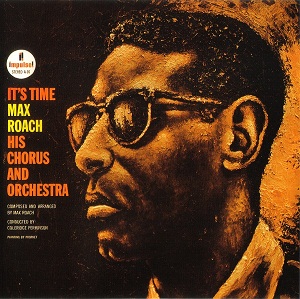
It's Time is a 1962 album by jazz drummer Max Roach, released on Impulse! Records which also features trumpeter Richard Williams, tenor saxophonist Clifford Jordan, trombonist Julian Priester, pianist Mal Waldron, bassist Art Davis, and a vocal choir conducted by Coleridge-Taylor Perkinson. Singer Abbey Lincoln appears on "Lonesome Lover".

Tour de Force is an album by jazz saxophonist Sonny Rollins containing his final recordings for the Prestige label. Rollins performed with Kenny Drew, George Morrow, and Max Roach, with vocals by Earl Coleman on two tracks.

Booker Little is an album by American jazz trumpeter Booker Little featuring performances recorded in 1960 for the Time label.

Booker Little and Friend is the final album led by American jazz trumpeter Booker Little featuring performances recorded in 1961 for the Bethlehem label. It was reissued under the title Victory and Sorrow in the vinyl era. The CD reissue added two previously released alternate takes.
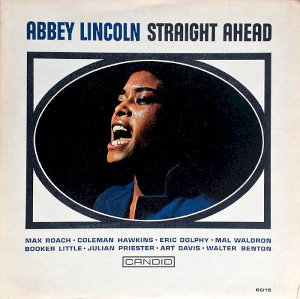
Straight Ahead is an album by American jazz vocalist Abbey Lincoln featuring performances recorded in 1961 for the Candid label.

Deeds, Not Words is an album by American jazz drummer Max Roach featuring tracks recorded in 1958 and released on the Riverside label.

The Max Roach 4 Plays Charlie Parker is an album by American jazz drummer Max Roach featuring tracks associated with Charlie Parker recorded in late 1957 and 1958 and released on the EmArcy label. It is also the first album to feature Roach playing without a piano.

Jazz in ¾ Time is an album by American jazz drummer Max Roach featuring tracks recorded in late 1956 and early 1957 and released on the EmArcy label.

Max Roach + 4 on the Chicago Scene is an album by the American jazz drummer Max Roach featuring tracks recorded in Chicago in 1958 and released on the EmArcy label in mono; alternate versions of four tracks were released in Japan on a 1984 stereo reissue.
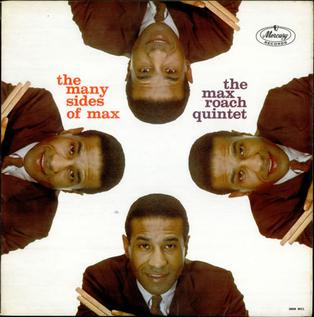
The Many Sides of Max is an album by American jazz drummer Max Roach featuring tracks recorded in 1959 but not released on the Mercury label until 1964.
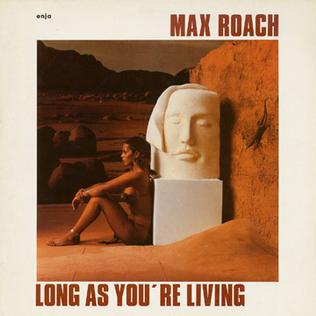
Long as You're Living is a live album by American jazz drummer Max Roach, featuring tracks recorded in West Germany in 1960 and released on the Enja label.
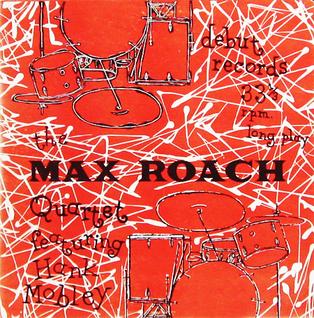
The Max Roach Quartet featuring Hank Mobley was the debut album by American jazz drummer Max Roach featuring tracks recorded in 1953 and first released on the Debut label as a 10-inch LP.

Newport Rebels is an album by various artists released under the Jazz Artists Guild, led by bassist Charles Mingus and drummer Max Roach, that was recorded in November 1960 and released on the Candid label.

Drum Suite is an album by American jazz trombonist, composer and arranger Slide Hampton which was recorded in 1962 and first released on the Epic label.

Rainbow Mist is an album by the American jazz saxophonist Coleman Hawkins compiling recordings from 1944 originally released by Apollo Records that was released by the Delmark label in 1992.




















